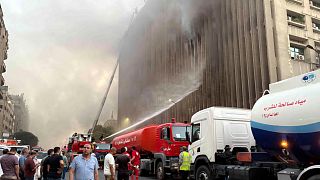Egypt
A fire triggered by an avoidable oxygen leak and an "unprofessional" crew: expert reports shed light on the reasons for the crash of the Egyptair plane in the Mediterranean in 2016, which killed 66 people.
The plane operating flight MS804, from Paris to Cairo, had crashed into the Mediterranean Sea on May 19, 2016, between midnight and one o'clock in the morning, between Crete and the northern coast of Egypt, after having suddenly disappeared from radar screens. The 66 people on board, including 40 Egyptians and 15 French, had perished.
In this case heavy with human but also diplomatic stakes, Cairo had claimed in December 2016 to have discovered traces of explosives on the remains of victims, raising skepticism on the French side especially since no organization had claimed an attack.
Paris, for its part, favored the theory of a technical incident.
Since May 2016, three expert reports have been submitted to the French judicial investigation, establishing that a fire broke out in the cockpit, which the crew left in a hurry because they were unable to find and use a fire extinguisher, which caused the plane to crash a few minutes later.
In a report of June 2021, three experts who had access to the recordings of the black boxes found one month after the crash had highlighted as the cause of the disaster an "uncontrolled" fire in the cockpit.
According to them, this fire was the result of "the ignition of a flow of pure oxygen released by an untimely and involuntary activation of the co-pilot's quick-fit mask".
Disregarding "a spontaneous start of fire in the only presence of the oxygen leak", they evoked three possible elements "all of human origin": "a blanket charged in static electricity asked by the pilot" to sleep, "fatty bodies being part of the meal served to the pilot and finally a high probability of a lighted cigarette or a stub being consumed in an ashtray".
The investigation has indeed established that the crew regularly smoked in the cockpit, and especially shortly before the accident, which is "catastrophic during a leak of pure oxygen", underlined the expertise, even if it is not established at this stage that this practice was prohibited by the regulations of Egyptair.
In addition to this cockpit "considered as the smoking area of the plane", the experts had noted other elements attesting to a "non-professional behavior" of the crew: "lack of attention concerning the flight monitoring", music, multiple comings and goings in the cockpit, etc.
'Negligence'
Recently, a synthesis of expertise dating from March revealed Tuesday by the Corriere della Sera was added to the file.
In their conclusions, the five experts agree on "the leakage of oxygen from the co-pilot's quick-donning mask" as "being the determining element in the cause of the fire".
This leakage "was made possible by the non-conforming position" of an activation button of this mask in the cockpit, which had been checked three days before the crash by a technician during the replacement of the case of this same mask.
The good position of this button should have been checked by the technician and by the crew before the takeoff, underline the experts.
For as much, this report repeats that it is not possible to "establish with certainty" the element which, in the presence of the oxygen leak, started the fire. It takes up the three hypotheses: cigarette, fatty substance, spark of static electricity.
While a first expertise of June 2018 dedicated to the maintenance of the aircraft had estimated that it "should not have left Cairo", its base of departure, "after the chain of recurring defects, but not reported by successive crews", the new expertise recognizes various technical problems that have affected the aircraft but believes that "no situation of NOGO", a diagnosis that prohibits the departure of an aircraft, "has been identified on the flights preceding flight MS804".
For two representatives of the association of victims' families of the crash Egyptair MS804, "there was a maintenance deficit, a series of negligence and serious irregularities."
"We ask that Egyptair be indicted and face its responsibilities," they continued with AFP, denouncing the positioning of Egypt, which has "no willingness to cooperate" with the investigation, according to them.













01:23
France: Prime minister proposes cutting two public holidays to save money in 2026 budget
01:00
Giant mural in France critiques Trump's immigration policies
02:20
France: Avignon Festival celebrates Egyptian diva Umm Kulthum
00:56
India: airlines ordered to inspect Boeing airplane models after crash
01:42
Gaza conflict overshadows EU-Southern Neighbourhood talks in Brussels
01:00
Pix of the Day: July 10, 2025